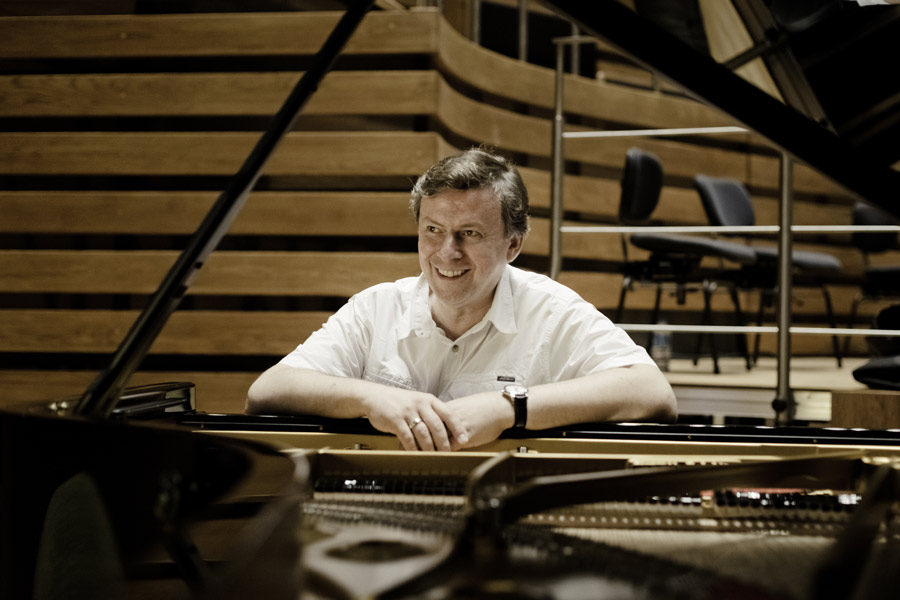Konstanty Andrzej Kulka studied violin at the National Music High School and the National Music Academy, in Gdańsk, under Stefan Herman. He won the International Radio Contest ARD in Munich in 1964. He has performed as a soloist with orchestras including the Berliner Philharmoniker, the Chicago Symphony Orchestra, the London Symphony Orchestra, the Royal Concertgebouw Orchestra, and the Saint Petersburg Philharmonic Orchestra. In 1981, his recording of Szymanowski's Violin Concerto No. 2, on EMI, was awarded the Grand Prix du Disque. He is a great champion and interpreter of Witold Lutosławski, Krzysztof Penderecki, Henryk Hubertus Jabłoński, Augustyn Bloch, and Eugeniusz Knapik. Mr Kulka served as a professor at the Warsaw Academy of Music as head of the Department of String Instruments. He has been honoured by Ministry of Culture and National Heritage, the Ministry of Foreign Affairs and the Order of Polonia Restituta.
Tomasz Strahl graduated in 1989 from the cello studio of the Chopin Music Academy in Warsaw under Kazimierz Michalik and studied chamber music with violinist Krzysztof Jakowicz. He continued his studies with Tobias Kühne at the Hochschule für Musik und Darstellende Kunst in Vienna. Strahl received 1st Prize at the Academic Cello Competition in Warsaw in 1987 and 1st Prize at the 5th Nicanor Zabaleta International Music Competition in San Sebastián in 1991. In 1993, he performed Witold Lutosławski's Cello Concerto for the composer and has appeared at the prestigious Brucknerhaus in Linz. In 1994 he received a grant from the Polish-Japanese Foundation JESC. Strahl received the title of Professor in June 2001 and the Golden Cross of Merit in 2002. In 2005 he gave a series of lectures and concerts at the prestigious International Academy Vienna-Prague-Budapest. Strahl received the Fryderyk Prize of the Polish recording industry in 2003. He currently serves as a professor of cello at the Music Academies in Warsaw and Łódż.
Krzysztof Jabłoński was born in Wrocław. He studied piano under Andrzej Jasinski at the Academy of Music in Katowice and earned his PhD in 1996. Jabłoński was awarded First Prize at the International Invitational Piano Competition in Palm Beach, Florida in 1988 as well as winning the International Piano Competition, Rina Sala Gallo, in Monza, Italy, that year. He founded the Chopin Duo with Tomasz Strahl in 1999 and since 2004 he has been a member of the Kwintet Warszawski, founded by Wladyslaw Szpilman in 1962. Mr Jabłoński has served as a professor of piano at the Academies of Music in Wrocław and Katowice and at the F. Chopin Academy of Music in Warsaw. He currently teaches at the Mount Royal University Conservatory in Calgary and at the University of Calgary. He is also on the faculty of the Morningside Music Bridge Program.
Remarkably, Frédéric Chopin’s reputation as a pianist is based on a mere thirty or forty concerts. He disliked playing to large crowds and in big concert halls and after settling in Paris he performed in public only twice a year. Chopin made a career writing small-scale piano pieces and never thought of composing a symphony. It is only in his two piano concertos, composed as showcases for a travelling virtuoso, that he even attempted to write for orchestra. His style is evidence of his keen understanding of the relationship between improvising and composing. From childhood, he had been making up his own music and his natural playing style translated into compositions with extraordinary sensitivity to colour, dynamics, and tempo. As a Polish expatriate living in Paris following the November Uprising, the composer embraced his heritage and the Polonaise is closely linked to the national strand in his compositions. This explicitly Polish musical form which has been so closely identified with Poland's history through more than three centuries, originated in 1573 in Kraków on the occasion of the coronation of the young French prince, Henri d'Anjou, as king. In Poland, the polonaise, also known as the "chodzony", "chmielowy" and "świeczkowy" was danced by the Polish gentry, townsfolk and populace since the Baroque era and became a fashionable society dance at many European courts. The basic features of an authentic polonaise rhythm is a measure of six-eighths, though sometimes written in 3/4 time, of which the second eighth is divided into two-sixteenths. Polonaise has a moderate tempo, a distinguished character and is always a promenade march, not a dance. It is additionally, Slavonic in its general tone and aristocratic in its manner and mood.
Alixandra Porembski, English Language Annotator



